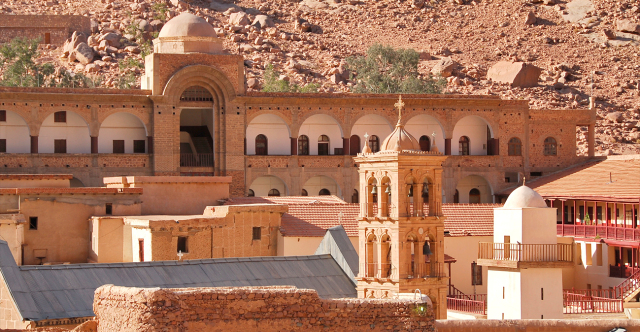Athens welcomed the late-night clarifications from the Egyptian government, confirming that the religious significance of the Monastery of Saint Catherine in Sinai remains intact. This reassurance comes despite some government officials stressing that Egypt needs to fulfill its commitments and finalize the pending agreement to safeguard the monastery’s status.
The tense situation that developed from midday onwards was a reaction to a ruling by the Ismailia Court of Appeal, which negatively impacted a significant portion of the monastery’s property. This led to heightened tensions and prompted the government to activate its crisis management protocols. While communication lines were “busy,” both the Greek Foreign Ministry and the Egyptian presidency worked to manage the unfolding narrative.
“The Presidency of the Republic reaffirms its unwavering commitment to preserving the unique and sacred religious status of the Monastery of Saint Catherine and ensures that this status will not be compromised. The recent judicial ruling further reinforces this status,” stated the spokesperson for the Egyptian presidency in a late-night statement. The Egyptian Foreign Ministry added through a MENA agency statement that the sacred character of the monastery is upheld by the court decision, allowing monks to access the religious and archaeological sites in the region. An official statement from the Egyptian presidency was also released.
Egypt’s efforts to reshape the narrative—both domestically and globally—appeared to have been influenced by high-level diplomatic advice from Greece. According to reports from protothema.gr, Foreign Minister Gerapetritis maintained ongoing communication with both the Egyptian Foreign Ministry and presidency throughout the afternoon to clarify the court ruling and ensure Egypt’s intentions were properly understood. While there are no reports of direct communication between Prime Minister Mitsotakis and President el-Sisi, such discussions cannot be ruled out later today.
The Commitments
As diplomatic circles sprang into action, the Greek side expressed surprise at the court’s decision. Recent weeks had seen assurances from Egyptian President el-Sisi, including during his visit to Maximos Mansion, that a Greece-Egypt agreement to protect the Greek Orthodox character of the monastery was imminent. This matter holds personal significance for Prime Minister Mitsotakis, who visited the monastery decades ago alongside his father, Konstantinos Mitsotakis.
Government sources highlighted yesterday that there were no signs of the monastery being expropriated or closed. However, the status of the monks remains uncertain due to the monastery’s autonomous governance. They clarified that the court ruling pertains to a small portion of the monastery’s property—specifically certain farmland where the monastery lacks formal ownership titles. Monks argue that the establishment of the Egyptian state occurred after the church’s property was acquired.
In any case, Egyptian officials expressed their intention to preserve the “fraternal” relationship between Greece and Egypt.
Reactions
Initial responses to the court ruling and statements from monastery representatives proposing a conversion into a museum stirred controversy in Egypt. Archbishop Ieronymos criticized the decision as a “sacred desecration,” urging the government to take action. Former Prime Minister Antonis Samaras accused the administration of causing international embarrassment. All opposition parties reacted similarly, and several New Democracy officials, including Dora Bakoyannis, Dimitris Avramopoulos, Euripides Stylianidis, Maximos Harakopoulos, and Stelios Petsa, called for diplomatic and international efforts.
A senior diplomatic source shared with protothema.gr late in the night that, considering Egypt’s assurances, the situation is “shameful for those who hastily raised the banner of revolution without fully understanding the court’s decision.”
Ask Me Anything
Explore Related Questions

















